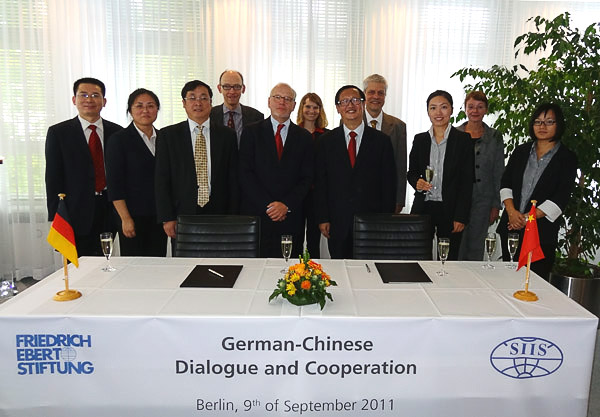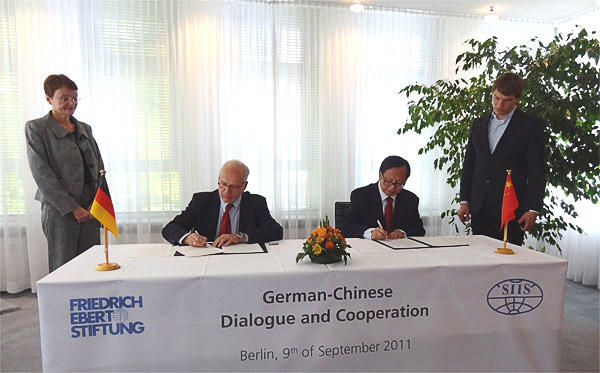Cooperation Agreement between the Shanghai Institutes for International Studies (SIIS) and the Friedrich-Ebert-Stiftung (FES)
2016/09/10 read:551
Speech
By
Prof. Yang Jiemian
President, Shanghai Institutes for International Studies
On the occasion of the signing of the
Cooperation Agreement between the Shanghai Institutes for International Studies (SIIS) and the Friedrich-Ebert-Stiftung (FES)
30 Years of Past and of 30 Years of Future:
SIIS-FES Cooperation in Retrospect and Prospect
Dear Secretary General Roland Schmidt,
Ladies and Gentlemen:
Thank you very much for your warm words about the SIIS and the high remarks of the SIIS-FES cooperation. Indeed, it is both institutional and personal moment for me to renew the Cooperation Agreement for the 12th time.
As the president of the SIIS, I am honored to co-sign the Agreement with Secretary General Schmidt as an expression of our determination to continue our cooperation. Our cooperation can be traced to the beginning of China’s great course of reform and open-up thanks to the vision and guidance by late Deng Xiaoping and late Willy Brandt. Thirty years ago my predecessor and esteemed Mr. LI Chuwen who made a pioneering trip to Bonn, the then capital of West Germany. In 1983 the SIIS and FES jointly launched the first international conference on the North-South Relations in Shanghai. In 1984 our two organizations signed the first Cooperation Agreement that started the first office of FES in China. We have felt greatly honored to be the host of this first office and received many FES and SPD eminent figures including Willy Brandt and Egon Bahr.
Our institutional cooperation covers many areas and includes various activities. Our cooperation started from a forward-looking perspective of international relations 30 years ago, that is the North-South relation. Now our cooperation includes but is not limited to world high politics, economic topics, climate change, social managements and many others. Besides, we, jointly or respectively, promote mutual group visits and individual exchange programs, sponsor international conferences and speeches, support field trips and individual interviews.
Personally, I was very proud that I was a part of the SIIS-FES cooperation 30 years ago when I served as a translator as well as an interpreter. In the past 30 years, my fellow colleagues and I have learnt a great deal from our German colleagues. I think our German partners have had the same benefits. Whether in the official or personal capacity, I will keep on working at promoting this great cooperation.
The SIIS-FES cooperation is just a miniature of the Sino-German cooperation of the past 30 years. Look forward to the coming 30 years and beyond, we have more reasons to redouble our efforts and welcome greater achievements of our cooperation. The world is to undergo greater changes but our cooperation and friendship will remain the same. In turn, our solid cooperation and true friendship will contribute to a better world in the future.
Thank you again for your hospitalities and we are looking forward to return your kindness in Shanghai.
Speech
By
Dr. Roland Schmidt
Executive Director, Friedrich-Ebert-StiftungOn the occasion of the signing of the
Cooperation Agreement between the Shanghai Institutes for International Studies (SIIS) and the Friedrich-Ebert-Stiftung (FES)
Dear Professor Yang,
Dear members of the SIIS-Delegation,
Dear colleagues at FES,
Today we are gathering here in Berlin to sign the cooperation agreement between the Shanghai Institutes for International Studies (SIIS) and the Friedrich-Ebert-Stiftung. I find this difficult to believe, but we are now going to sign this very agreement for the 10th time!
That is what we can truly call a long lasting and successful relationship!
Let me therefore start my remarks by looking back into the annals of the FES.
When the first signature of this agreement took place in Bonn on November 4th of 1984, times were surely different. In May of that year Willy Brandt had for the first time visited China, with Egon Bahr, Hans-Jürgen Wischnewski and the head of the International Department of FES, Siegfried Bangert, as members of his delegation.
In 1984, China was in the middle of its „four modernisations“ and in Germany the peace movement opposed the deployment of Pershing missiles against the perceived nuclear threat of the Soviet SS 20.
The Chinese delegation returning Willy Brandt’s visit later that year saw the protests in Bonn and wondered what this meant for China.
Looking further back, exchanges between Chinese organisations and FES had already started in 1978. In 1981 the then director of SIIS, Li Chuwen, had paid FES a visit, leading to discussions about a closer relationship.
But it was the cooperation agreement between SIIS and FES that marks the first institutionalized exchange between a Chinese organisation and a German political foundation.
It is to the credit of both organisations that they overcame the considerable bureaucratic obstacles on either side to establish a meaningful and constructive cooperation „to promote the scientific, economic and social exchange between the Federal Republic of Germany and the city of Shanghai“, as it reads in the original document.
As a result the FES-Shanghai office opened in April 1985, two years before a second FES-bureau could be established in the Chinese capital. Thus, Shanghai paved the way for Beijing to follow. The need for economic exchanges had prepared the ground for political dialogue.
It would take me too long to describe the long path and the many projects of this cooperation over 27 years.
During this quarter of a century Shanghai has doubled its population and China has undergone the kind of change that took us Europeans almost two centuries to achieve.
As a result China has reemerged on the international stage as a world power and a crucial participant in all global debates from regional security to energy policies, from climate change to the debt crises of the West.
If it was not yet clear what Soviet missiles in Europe meant to China in 1984, it is all too obvious to us in 2011 what China’s economy means to Europe today.
SIIS has been at the forefront of these developments by contributing greatly to their analysis and by advising the Chinese government on foreign policy. As a leading think tank in China it also ranks in the top ten of global think tank ratings.
And under your leadership, Prof. Yang, SIIS has further increased its reputation by taking on the new topics of global governance - from the rise of the BRIC-countries to China’s new responsibilities in the UN-system.
I think the wide range of conferences and workshops, jointly organised by SIIS and FES, reflect these rapid developments very well.
These days in Shanghai all aspects of governance are debated in three-way-conferences where participants from China, Europe and the United States share their experiences on global questions.
Or they become the topic for fellows from SIIS who study „EU-economic policies“ or the „Challenges for Sustainable Development in the G 20 group“ in Brussels or Berlin, as happened in 2011.
SIIS has supported FES in applying for the residence permits for more staff which is very important for our future work in Shanghai. Our day-to-day cooperation is –thanks to Ms Fang who is present here – excellent.
We are very grateful for this assistance and we are glad that in our cooperation with SIIS, the Friedrich-Ebert-Stiftung can play a small part in furthering global debates and finding common answers to the urgent questions of reform and governance.
I therefore think that our current conference formats, debates and exchanges should be continued and intensified between SIIS and FES in the future.
Dear Prof. Yang,
Dear Guests,
Dear Colleagues,
Looking at the past and present of our relationship –it has become a model of cooperation for others to emulate.And I can just hope that the mutual respect which has led to such a lasting and effective partnership between the “Shanghai Institutes for International Studies” and the Friedrich-Ebert-Stiftung will also shape European-Chinese relations for future generations.


